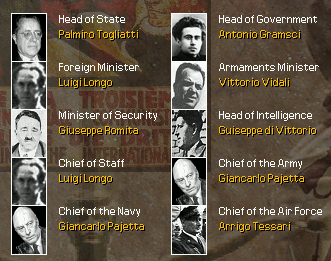Socialist Republic of Italy
From Kaiserreich
Republic of the Sicilies is a country in southern Europe and dominates the southern half of the Italian Peninsula. It is bordered only by the Italian Federation in the north.
History
The kingdom of Naples (‘the Two Sicilies’) had ruled southern Italy up until its annexation into the unified kingdom of Italy in 1860. With the collapse of Italy at the end of the Great War the victorious Central Powers chose to resurrect the nation as part of their 'divide and weaken' plan for the peninsula, setting up a puppet king on the throne. Surprisingly for the Austrians, there was much opposition to this plan from the traditionally conservative peasantry, which was so strong as to result in a series of uprisings. At the same time Anarcho-Syndicalist movements began to grow in the new state, and encouraged by events elsewhere in the world became increasingly aggressive. Before long ‘the Two Sicilies’ were in chaos, a chaos which lasted for the next year and a half. Many Syndicalist leaders in northern Italy, who were unable to do act due to the Austrian occupation, migrated south and served to further fuel the growing Syndicalist groups there, and they encouraged political alliances with the anarchists, which allowed them to increase their power greatly. In February 1921 the Anarcho-Syndicalists felt ready to launch the revolution, which was joined by large parts of the deeply discontent peasantry, who saw it primarily as a chance to rid southern Italy of Austrian influences. After two months of civil war the Anarcho-Syndicalists triumphed, the ‘Republic of the Sicilies’ declared, and an alliance with France forged. With Germany’s refusal to intervene Austria was grudgingly forced to recognise the new regime. In the 15 years since the Republic’s founding it has slowly rebuilt and attempted to industrialise itself, strengthening its economy and military as it plans how best to reunify Italy and once more create a united Italian Republic.
Politics
There are three main unions within the Greater Sicilian Union, the only party of Republic of the Sicilies: Anarcho-Syndicalist Union, of stern syndicalist views, currently ruling the country; Social-Anarchist Union, less radical, a bit like the Union of Britain; and at least the National-Syndicalist Union, believing in the short-lived Bolshevik system, currently led by General Responsible for Transports Benito Mussolini.
President of the Republic of Sicilies : Palmiro Togliatti (Anarcho-Syndicalist Union, born 1893)
Chairman of the House of Commons: Antonio Gramsci (Anarcho-Syndicalist Union, born 1891)
General Responsible for Diplomacy and for People's Army Direction: Luigi Longo (Anarcho-Syndicalist Union, soft wing, born 1900)
General Responsible for People's Army Needs: Vittorio Vidali (Anarcho-Syndicalist Union, born 1900)
General Responsible for Police: Giuseppe Rosita (Social-Anarchist Union, born 1887)
General Responsible for Intelligence: Giuseppe di Vittorio (Anarcho-Syndicalist Union, born 1892)
General Responsible for People's Army and People's Navy: Giancarlo Pajetta (Social-Anarchist Union, born 1911)
General Responsible for People's Air Force: Arrigo Tessari (Social-Anarchist Union)
Foreign Relations
Alliance (also known as The International) with Commune of France.
Very good relations with Union of Britain.
Friendly relations with Russia, Albania and Serbia.
Unfriendly relations with Germany, Canada, Croatia, Bosnia, Spain and Ottoman Empire.
Declared hostility against Italian Federation, Austria-Hungary and National France.


